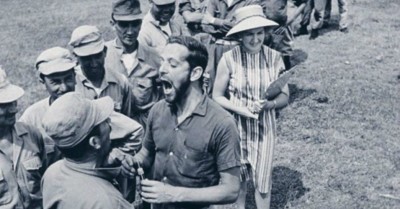Johns Hopkins University Sued Over 1950s Non-Consensual STD Study

Image: Johns Hopkins and Rockefeller Center officials knowingly infected victims with syphilis and other STDs without their consent, a lawsuit filed Wednesday alleges. (Photo: AP)
More than 750 plaintiffs are suing Johns Hopkins University over its alleged role in a series of medical experiments in Guatemala in 1940s and 50s, which involved knowingly infecting participants with sexually transmitted diseases without their consent.
The claim, which was filed in Baltimore, Maryland on Wednesday and seeks $1 billion in damages for the 774 plaintiffs and their families, charges that Johns Hopkins Hospital System Corp. officials had “substantial influence” over federal spending on the experiments, with crucial roles on government panels that reviewed and approved funding for the tests.
Also named in the suit are the Rockefeller Foundation and pharmaceutical company Bristol-Myers Squibb.
Between 1945 and 1956, U.S. researchers infected Guatemalan subjects with syphilis, gonorrhea, and chancroid without their consent. Participants in the studies were primarily sex workers, soldiers, and prisoners. Orphans, mental patients, and children who attended state-run schools were also exposed to the disease.
Along with the infamous Tuskegee and Terra Haute prison experiments, the Guatemala tests were conducted to determine how to stop the spread of STDs, particularly among soldiers at war. The lawsuit is the latest effort to obtain reparations for the victims. A previous federal lawsuit was dismissed in 2012 on the grounds that the U.S. government cannot be held accountable for actions committed in other countries.
President Barack Obama in 2010 apologized for the country’s role in the experiments, which he called “clearly unethical.”
Johns Hopkins has described the experiments as “deplorable” and “unconscionable,” but maintains that it had no role in designing, funding, or conducting the research. The Rockefeller Center, which said the tests were “morally repugnant,” said the same.
Bristol Myers-Squibb did not comment on the lawsuit.
Despite those denials of wrongdoing, the lawsuit charges that the experiments were conducted with the “support, knowledge and approval of agents, servants and employees of Hopkins and the Rockefeller Foundation.” It notes that a Johns Hopkins doctor chaired a committee of the National Research Council focused on venereal diseases and that three other committee members with ties to Hopkins were on the panel when it reviewed a proposal for the Guatemala tests.
It also notes that a doctor employed by the Rockefeller Center who in 1947 was named “responsible investigator” for the experiments.
Paul Bekman, one of the attorneys on the case, told the Baltimore Sun on Wednesday that the lawsuit is about more than just resolving the injustices for the victims. “This is about accountability and responsibility,” he said.
To the Associated Press, he added,
“The people involved were icons at Johns Hopkins Hospital and the Rockefeller foundation They knew about it, they were architects of it, they planned it, they sought funding for it, they kept it under the radar. Hopkins provided syphilitic rabbits that were used to inject individuals with syphilis.”

